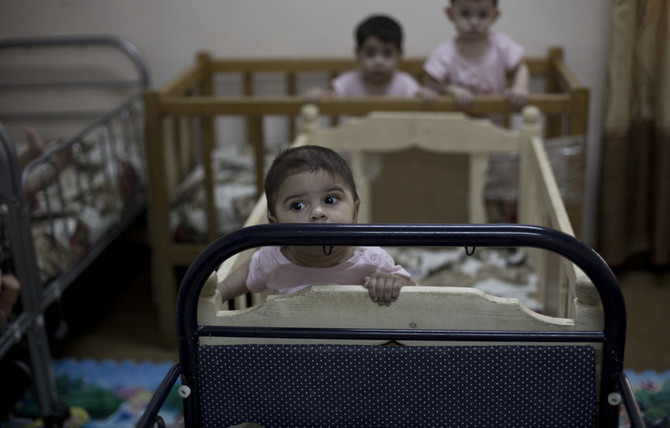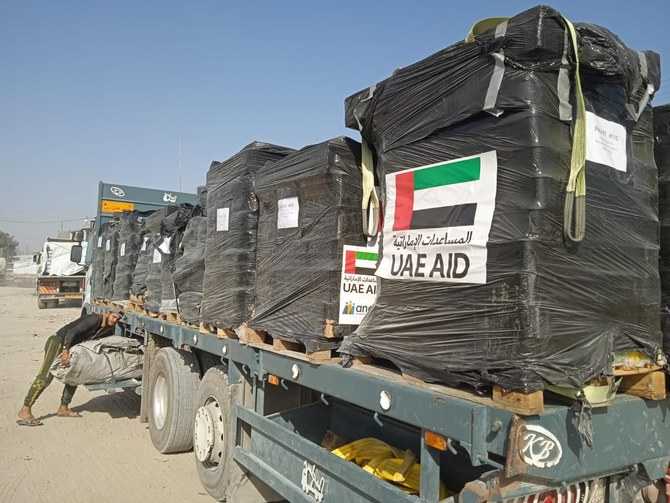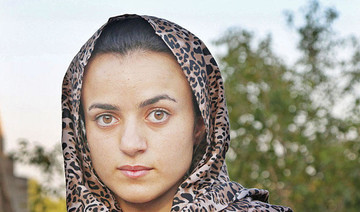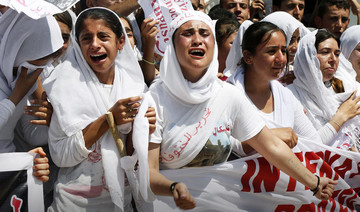DAHUK, Iraq: The 26-year-old Yazidi mother faces a heartbreaking choice.
Her family is preparing to emigrate from Iraq to Australia and start a new life after the suffering Daesh wreaked on their small religious minority. She is desperate to go with them, but there is also someone she can’t bear to leave behind: Her 2-year-old daughter, Maria, fathered by the Daesh fighter who enslaved her.
She knows her family will never allow her to bring Maria. They don’t even know the girl exists. The only relative who knows is an uncle who took the girl from her mother and put her in an orphanage in Baghdad after they were freed from captivity last year.
“My heart bursts from my chest every time I think of leaving her. She is a piece of me, but I don’t know what to do,” she said, speaking to The Associated Press at a camp in northern Iraq for displaced Yazidis.
The woman spoke on condition she be identified only as Umm Maria, or “mother of Maria,” for fear her family and community would find out.
Umm Maria’s torment points to the gaping wounds suffered by Iraq’s Yazidi religious minority at the hands of Daesh. When the militants overran the Yazidis’ northern Iraqi heartland of Sinjar in 2014, they inflicted on the community an almost medieval fate. Hundreds of Yazidi men and boys were massacred, tens of thousands fled their homes, and the militants took thousands of women and girls as sex slaves, viewing them as heretics worthy of subjugation and rape.
The women were distributed among Daesh fighters in Iraq and Syria and over the following years were traded and sold as chattel. Many women bore children from their captors — the numbers of children are not known, but they are no doubt in the hundreds.
The Nobel Peace Prize this year put a focus on victims of sexual violence and on the Yazidis in particular, when one of the women abducted by Daesh, Nadia Murad, was named a co-winner of the award.
Many, though not all, of the women have returned home, as the extremist group’s “caliphate” in Iraq and Syria has been brought down. While some of them want nothing to do with babies born of rape and slavery, some, like Umm Maria, want to keep them.
But Yazidi families most often reject the children.
That is a reflection the deeply entrenched traditions followed by the Yazidi community, seeking to preserve its identity among the mainly Muslim population, many of whom for centuries viewed the ancient faith with suspicion. The Yazidis, who speak a form of Kurdish, keep their community closed off, their rituals little known.
They have always rejected mixed marriages and children fathered by non-Yazidis. In this case, the stain is even greater since the fathers were the same Sunni Muslim radicals who sought to wipe out the community. Under Iraqi law, the children are considered Muslims.
The community has taken a relatively progressive stance toward the mothers. In Iraq’s traditional society, rape can bring stigma on the victim. But the Yazidis’ spiritual leader, Babashekh Khirto Hadji Ismail, issued an edict in 2015 declaring women enslaved by the militants to be “pure,” with their faith intact. The declaration allowed the women to be welcomed back into Yazidi society.
But not the children.
Khidr Domary, a prominent Yazidi activist, acknowledged that the community’s insular traditions need some reform and said the leadership has shown flexibility as it tries to deal with the trauma left by Daesh, known by their group’s Arabic acronym, Daesh. He said mothers should be free to bring back Daesh-fathered children if they wish.
But “that cannot include reform to accommodate the results of Daesh crimes,” he said. Pressure from family and society against accepting the children is powerful.
“It is difficult, even for the mother, to bring a child to live in our midst when it is possible that his Daeshi father may have killed hundreds of us with his own hands, including relatives of the mother,” he said.
Umm Maria was taken captive along with other women in August 2014, when the militants stormed Sinjar, near the Syrian border. She was eventually taken to Syria as the slave of an Daesh fighter, whom she knew only by his alias, Abu Turab.
Abu Turab was killed in fighting in 2015. His family sold her for $1,800 to another militant, an Iraqi she identified as Ahmed Mohammed. He took her to Iraq’s Mosul, where she lived with his first wife and their children. Soon after she gave birth to Maria, he too was killed in fighting in 2015.
She was consigned to a Daesh “guesthouse” where wounded Daesh fighters received first aid or took a rest from the front lines — and used Yazidi women for sex.
As Iraqi security forces assaulted Mosul, the women at the house were moved from one neighborhood to another to escape bombardment. In the summer of 2017, as the city fell, Umm Maria escaped into government-held territory, though she was injured during the shelling.
At the hospital, an uncle persuaded Umm Maria to give them the child until she healed, promising to return Maria to her afterward.
“Had I known they planned on depositing her in an orphanage, I would have never given her,” she said.
Umm Maria has seen the child — now around 3 years old — only once since. Several months ago, she visited her at the Baghdad orphanage, spending two days with Maria.
“She did not recognize me, but I recognized her,” Umm Maria said. “How could I not? She is a piece of me.”
Many Yazidis see it as more essential than ever for the community to protect its identity at a time when it is struggling for survival. The Yazidis were estimated to number about 700,000 before 2014. Since the IS onslaught, nearly 15 percent are believed to have fled the country, mostly to the West. Nearly half of those still in the country live in camps for the displaced, scattered around northern Iraq.
About 3,000 Yazidis remain missing or in captivity. Of these, experts believe only a third may still be alive.
The Yazidis are also trying to regain their place in a country where the social fabric has been torn apart by IS. Though there were always tensions, Yazidis lived side-by-side with Muslim neighbors in a northern region that is home to many minorities, including Christians and Kurds.
Now Yazidis deeply distrust Arab Muslims, accusing them of sympathizing with Daesh and even sometimes joining the militants in the slaughter and enslavement of Yazidis. The community also says the central government has not done enough to get back Yazidi women. It was largely left to families to put together thousands of dollars to buy back daughters or wives, or pay smugglers to sneak them out.
“We have become so resentful of Muslims that we now tell our children not to be like Muslims when they are mean to each other,” said Abdullah Shirim, a Yazidi businessman.
Shirim is credited with rescuing dozens of Yazidi women from captivity through a network of business contacts, smugglers and bands of bounty hunters.
The community is wrestling with integrating thousands of Yazidi children affected by the war. Those whose parents are missing or dead are usually taken in by extended family, but if relatives can’t afford it, they end up in orphanages. Children snatched by Daesh and raised as Muslims have to be retaught the Yazidi faith. Boys forced to become child soldiers have to be led back from Daesh’s virulently violent training.
Amid those traumas, there is little sympathy for children fathered by militants.
Another Yazidi woman, a 21-year-old who asked to be identified only as Umm Bassam, described how when she left Daesh territory in Syria in August, she contacted her family and asked if she could bring home her 9-month-old son, Bassam, fathered by the Daesh militant who held her.
Their reply: “We cannot allow a Daeshi baby to live with us.”
Umm Bassam had been in Daesh captivity for several years. The Daesh fighter who held her — an Iraqi — took her across the border into Syria in the summer of 2017 as the militants’ rule crumbled in Iraq.
In Syria, she gave birth. She, the IS fighter and their child had to flee from town to town as the militants lost ground in Syria. Eventually, the fighter had her smuggled out to Kurdish-held territory, while he fled into the desert along with other militants.
In the Syrian Kurdish city of Qamishli, Umm Bassam ended up in a house with other freed Yazidi women, many of them also with children.
After her family’s rejection, she relented and agreed to leave Bassam with Kurdish authorities. They tried to reassure her, she said, telling her the child would be cared for in an orphanage. They said at least 100 children had been left by Yazidi women.
“I was hugging him until the moment they took him away from me,” she said. They told her, “Don’t worry, in 10 days, he won’t remember you or recognize you. We will make him forget everything.”
But Umm Bassam remembers — every detail. Her son was chubby and fair-skinned, with a beautiful face, she said. He had a mole below his armpit.
Back among her community, cut off from her son by borders, traditions and officials, she sees no choice now. She will bury it all. She’ll get married, she says. She’ll build a new family.
“I’ll make it like I never saw anything. I’ll try to forget everything and start a new life.”
Yazidi mothers of children by Daesh face heartbreaking choices
Yazidi mothers of children by Daesh face heartbreaking choices

- While some of them want nothing to do with babies born of rape and slavery, some, like Umm Maria, want to keep them
- Yazidi families most often reject the children
Hezbollah fires rockets at Israel after south Lebanon strike kills 4 members of family

- Shells fall on Kiryat Shmona and reach northern Golan
- Maronite Patriarch Bechara Al-Rahi calls for end to war in southern Lebanon
BEIRUT: An Israeli airstrike killed four members of a family in a border village in southern Lebanon on Sunday, security sources said.
Hezbollah, in retaliation, fired Katyusha rockets at the northern Israeli town of Kiryat Shmona, close to the Lebanese border.
The four family members killed in Mays Al-Jabal were identified as Fadi Hounaikah and Maya Ali Ammar, and their sons Mohammed, 21, and Ahmad, 12.
The attack occurred when the family took advantage of a de-escalation of hostilities between Hezbollah and Israel to return to their properties to assess damage and move goods from their supermarket to a location outside the village.
A security source in the area told Arab News that while the family was gathering their groceries from the supermarket, an Israeli military drone spotted them and launched an attack, destroying the area and killing all the members of the family and injuring several civilians in the vicinity.
The source clarified that villages in the area were empty because “residents fled the area seven months ago.”
He added: “When residents want to enter these villages to attend victims’ funerals, they send their names and car number plates to the Lebanese Army and UNIFIL, who in turn coordinate with the Israeli side to spare these funerals (from attack).
“In general, people cannot enter border villages without taking into consideration the Israeli danger, as Israeli reconnaissance planes and drones are hovering over the area 24/7. However, what Israel committed against this family is a terrible massacre.”
Hezbollah responded to the incident by launching dozens of Katyusha and Falaq missiles at Israel. The group said the operation was “in response to the crime committed by Israel in the Mays Al-Jabal village.”
The Israeli Upper Galilee Regional Council announced that missiles hit buildings in Kiryat Shmona, while Israeli Army Radio reported that some of the rockets fell inside the city, causing a power outage.
An Israeli army spokesman reported that 65 rockets were launched from southern Lebanon toward Israeli settlements in the Upper Galilee region.
Meanwhile, Israeli airstrikes hit the villages of Al-Adissa and Kafr Kila, while artillery shelling hit the village of Aitaroun.
Maronite Patriarch Bechara Al-Rahi in his Sunday sermon called for an end to the war in southern Lebanon, urging an end to the “demolition of homes, the destruction of shops, the burning of the land and its crops, and the killing and displacement of innocent civilians and the destruction of their livelihood in an economic condition that has already impoverished them.”
Mohammed Raad, leader of Hezbollah’s parliamentary bloc, meanwhile, expressed his disapproval of the West’s backing for Israel.
He said that Israel “faces no international deterrent. On the contrary, some support it in committing crimes.”
He accused those who support Israel of being “hypocrites and liars who falsely claim to champion human rights, civilization, and progress in the West, (yet) they provide Israel with financial aid, weapons, smart bombs, and a continuous air bridge.”
Raad concluded: “We are not afraid of Israel’s insanity. We are prepared to confront them directly. We are prepared to sacrifice and shed blood to protect our homeland, independence, and honor.”
UNRWA chief says again barred entry to Gaza by Israel

- “Just this week, they have denied — for the second time — my entry to Gaza where I planned to be with our UNRWA colleagues including those on the front lines”: Lazzarini
JERUSALEM: The head of the UN agency for Palestinian refugees, UNRWA, said Sunday that Israeli authorities had barred him from entering Gaza for a second time since the Israel-Hamas war started on October 7.
“Just this week, they have denied — for the second time — my entry to Gaza where I planned to be with our UNRWA colleagues including those on the front lines,” Philippe Lazzarini wrote on X, formerly Twitter.
Lazzarini has been to Gaza four times since the war broke out including on March 17.
“The Israeli authorities continue to deny humanitarian access to the United Nations,” he said on Sunday.
“Only in the past two weeks, we have recorded 10 incidents involving shooting at convoys, arrests of UN staff including bullying, stripping them naked, threats with arms & long delays at checkpoints forcing convoys to move during the dark or abort,” Lazzarini said.
He also called for an “independent investigation” into rocket fire that led to the closure of a key Israel-Gaza aid crossing.
Hamas’s armed wing, Ezzedine Al-Qassam Brigades, claimed responsibility for the Sunday launch, saying militants had targeted Israeli troops in the area of Kerem Shalom crossing.
Houthis claim Red Sea victory against US Navy

- Militia forces lack technical or military capability to achieve their objectives in the Mediterranean, analyst says
AL-MUKALLA: The Houthis have reiterated a warning of strikes against ships bound for or with links to Israel — including those in the Mediterranean — as they claimed victory against the US Navy in the Red Sea.
The Houthi-controlled SABA news agency reported that the fourth phase of the militia’s pro-Palestine campaign would involve targeting all ships en route to Israel that came within range of their drones and missiles, noting that the US, UK, and other Western navies “stood helpless” in the face of their attacks.
“The fourth phase demonstrates the striking strength of the Yemeni armed forces in battling the world’s most potent naval weaponry, the American, British and European fleets, as well as the Zionist (Israel) navy,” SABA said.
Houthi military spokesman Yahya Sarea said on Friday strikes against Israel-linked ships would be expanded to the Mediterranean. Attacks would be escalated to include any companies interacting with Israel if the country carried out its planned attack on the Palestinian Rafah.
Since November, the Houthis have launched hundreds of ballistic missiles and drones at commercial and navy vessels in the Red Sea, Bab Al-Mandab Strait and the Gulf of Aden. They claim attacks are only aimed at ships linked with Israel in a bid to force an end to its siege on the Gaza Strip.
They have also fired at US and UK commercial and navy ships in international waters off Yemen after the two countries launched strikes against Houthi-controlled areas.
On Saturday, Houthi information minister Dhaif Allah Al-Shami claimed the US was forced to withdraw its aircraft carrier and other naval ships from the Red Sea after failing to counteract attacks. He added new offensives would begin against Israeli ships in the Mediterranean in the coming days.
“They failed badly. Yemeni missiles and drones beat the US Navy, and its military, cruisers, destroyers and aircraft carriers started to retreat from our seas,” Al-Shami said in an interview with Lebanon’s Al-Mayadeen TV news channel.
Yemen specialists have disputed Houthi assertions that they have military weapons capable of reaching Israeli ships in the Mediterranean.
Brig. Gen. Mohammed Al-Kumaim, a Yemeni military analyst, told Arab News on Sunday the Houthis would only be able to carry out such attacks if they had advanced weaponry. He said the Houthis were expanding their campaign against ships to avoid growing public resentment in areas under their control after the militia had failed to pay public employees and repair services.
Al-Kumaim added the Houthis might claim responsibility for an attack on a ship in the Mediterranean which was carried out by an Iran-backed group operating in the region.
“Theoretically and technologically, the Houthis lack any technical or military capability to achieve their objectives (in the Mediterranean),” Al-Kumaim said.
Jordanian-Iraqi economic forum begins at Dead Sea resort

- A specialized session will focus on investment prospects in various economic sectors
AMMAN: Jordanian Minister of Investment Kholoud Saqqaf opened the Economic Forum for Financial, Industrial, and Commercial Partnerships between Iraq and Jordan on Sunday.
The forum, which is organized jointly by the Iraqi Business Council in collaboration with the Jordan and Amman chambers of industry, aims to strengthen economic ties between the two countries.
Held at the King Hussein Convention Center on the shores of the Dead Sea, the forum is the largest regional gathering for fostering economic cooperation between Jordan and Iraq, Jordan News Agency reported.
Over two days, the event will promote regional integration by facilitating economic connectivity and encourage collaboration across sectors.
Discussions will cover investment opportunities in Jordan and Iraq, prospects for commercial and industrial ventures, economic modernization initiatives, and opportunities in Jordan’s free and development zones.
Key figures attending include Kamel Dulaimi, the Iraq president’s chief of staff, ministers from Jordan and Iraq, as well as business leaders, investors and representatives from Arab and foreign companies.
Discussions are expected to focus on the banking sector’s role in providing financial support, while highlighting success stories from investment companies in both countries.
A specialized session will focus on investment prospects in various economic sectors, with a particular emphasis on mining and industry.
At the opening, Saqqaf highlighted investment prospects displayed on the Invest in Jordan platform, which align with the kingdom’s Economic Modernization Vision.
Meanwhile, Iraqi Minister of Industry and Mineral Resources Khaled Battal Al-Najm drew attention to his country’s industrial strategy and plans for a joint economic zone with Jordan, alongside efforts to address unemployment and attract foreign investment, especially in mining.
Dulaimi emphasized the significance of Iraqi President Abdul Latif Rashid’s recent visit to Jordan, underscoring discussions aimed at strengthening ties and enhancing economic systems to facilitate investment projects.
UAE delivers 400 tonnes of food aid to Gaza

- Delivery, specifically for the northern areas of the enclave, is enough to feed about 120,000 people
DUBAI: The UAE, in partnership with American Near East Refugee Aid, announced on Sunday that it had delivered 400 tonnes of food aid to Gaza.
The delivery, specifically for the northern areas of the enclave, is enough to feed about 120,000 people, Emirates News Agency reported.
Reem Al-Hashimy, Emirati minister of state for international cooperation, said: “The UAE’s safe and successful delivery and distribution of food relief to the Gaza Strip, especially the northern Gaza Strip, marks a significant scaling up in action.”
She continued: “We remain firmly committed to our position of solidarity with the brotherly Palestinian people and alleviating suffering in the Gaza Strip. The UAE, working in parallel with international partners, is determined more than ever to intensify all efforts to ensure that aid lifelines get to those who need it the most.”
Sean Carroll, CEO of ANERA, thanked the Emirati government for its assistance in getting the much-needed aid to the Palestinian people.
“ANERA and the people we serve are extremely grateful for support from the government and people of the UAE, that allows us to deliver this food to northern Gaza, where the needs are so great,” he said.
Last month the UAE allocated $15 million under Cyprus’s Amalthea Fund to bolster aid efforts in Gaza.
Meanwhile, the Gulf country continues to collaborate with international partners and organizations to enable the effective delivery of food and relief via land, air and sea.
To date, the UAE has dispatched more than 31,000 tonnes of humanitarian supplies, including food, relief items and medical supplies, using 256 flights, 46 airdrops, 1,231 trucks, and six ships.
The UAE has embarked on several sustainable relief projects to ensure a consistent supply of food and water to the people of Gaza.
These initiatives include the establishment of five automatic bakeries, the provision of flour to eight existing bakeries, and the installation of six desalination plants with a combined capacity of 1.2 million gallons of water a day.




















